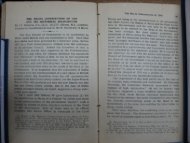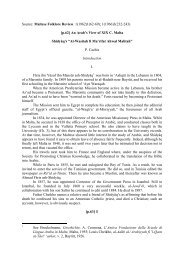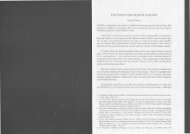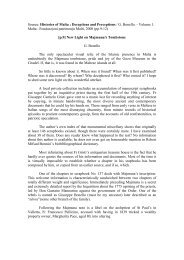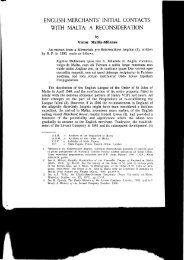essays on de soldanis
essays on de soldanis
essays on de soldanis
Create successful ePaper yourself
Turn your PDF publications into a flip-book with our unique Google optimized e-Paper software.
ESSAYS ON DE SOLDANIS<br />
agevolezza l’Idioma Punico Maltese ito ormai in dimenticanza.’<br />
As regards the ‘Vocabolario’ appen<strong>de</strong>d to the work he<br />
commented as follows: ‘Al dizzi<strong>on</strong>ario però bisognarebbe che<br />
fosse più copioso per aggevolare li curiosi di <strong>de</strong>tto Idioma.’ 59<br />
Rather surprisingly, <strong>de</strong> Soldanis states in a letter dated<br />
22 April 1753 that he was all the more encouraged to revise<br />
and enlarge his two dissertati<strong>on</strong>s published in Rome in<br />
1750 because he had been informed from Florence that<br />
they were being translated into English with a view to<br />
publicati<strong>on</strong> in that language. This informati<strong>on</strong> is c<strong>on</strong>tained<br />
in a manuscript letter bel<strong>on</strong>ging to Prof. Alain Bl<strong>on</strong>dy,<br />
of Sorb<strong>on</strong>ne, who very kindly copied it to Can<strong>on</strong> John<br />
Azzopardi, of the Cathedral Museum, Mdina, for eventual<br />
use by researchers. 60 The relevant extract from the letter,<br />
addressed to a corresp<strong>on</strong><strong>de</strong>nt who has not been i<strong>de</strong>ntified<br />
so far, reads as follows:<br />
Vò proseguendo per ora la fatica <strong>de</strong>’ due lessici promessi, ed ho<br />
di molto accresciuto quelle due dissertazi<strong>on</strong>i pubblicati in Roma<br />
l’anno 1750 sulla nostra lingua, incoragito a questa intrapresa,<br />
perche sento da Firenze, che si va traducendo in Inglese per<br />
imprimere in quell’idioma quel mio picciol trattatello.<br />
Dissenting voices, however, were not lacking. To give<br />
<strong>on</strong>e example, Bartolomeo Mifsud (1708-1781), better known<br />
as the Capuchin Padre Pelagio, of Żebbuġ, was a learned<br />
scholar who pointed out certain shortcomings in <strong>de</strong><br />
Soldanis’ grammar and criticised him for not c<strong>on</strong>sulting his<br />
friends before he formed his alphabet. He himself <strong>de</strong>vised<br />
a Punico-Maltese alphabet, which bears a lengthy title<br />
Alfabeto Punico-Maltese c<strong>on</strong> che facilissimamente da chichesia<br />
s’appren<strong>de</strong> il vero e proprio metodo di parlare, di scrivere e di<br />
leggere nell’idioma Maltese, servendosi <strong>de</strong>lle lettere <strong>de</strong>ll’alfabeto<br />
59 NLM Libr. 146 ii, f. 106r.<br />
60 See Bl<strong>on</strong>dy, 71-80, in the present volume.<br />
28



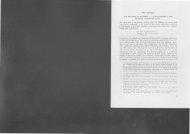

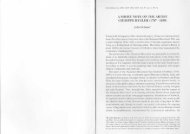
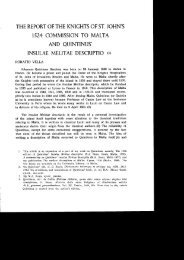
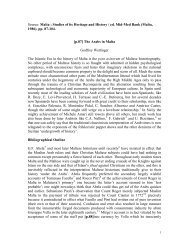
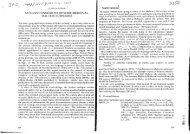
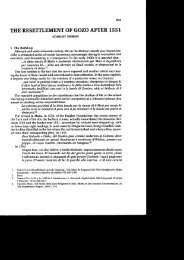
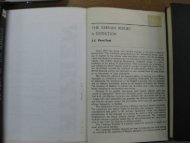

![Source: The Sunday Times [Malta]](https://img.yumpu.com/35239166/1/184x260/source-the-sunday-times-malta.jpg?quality=85)
